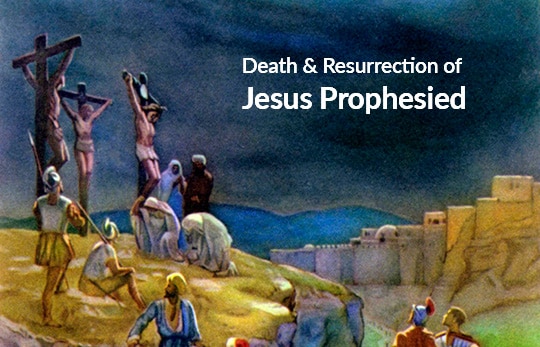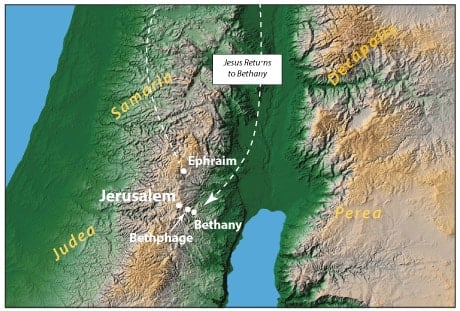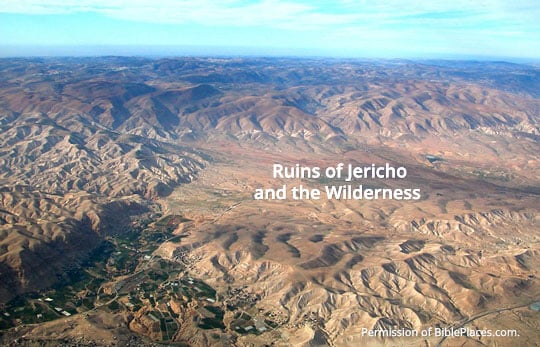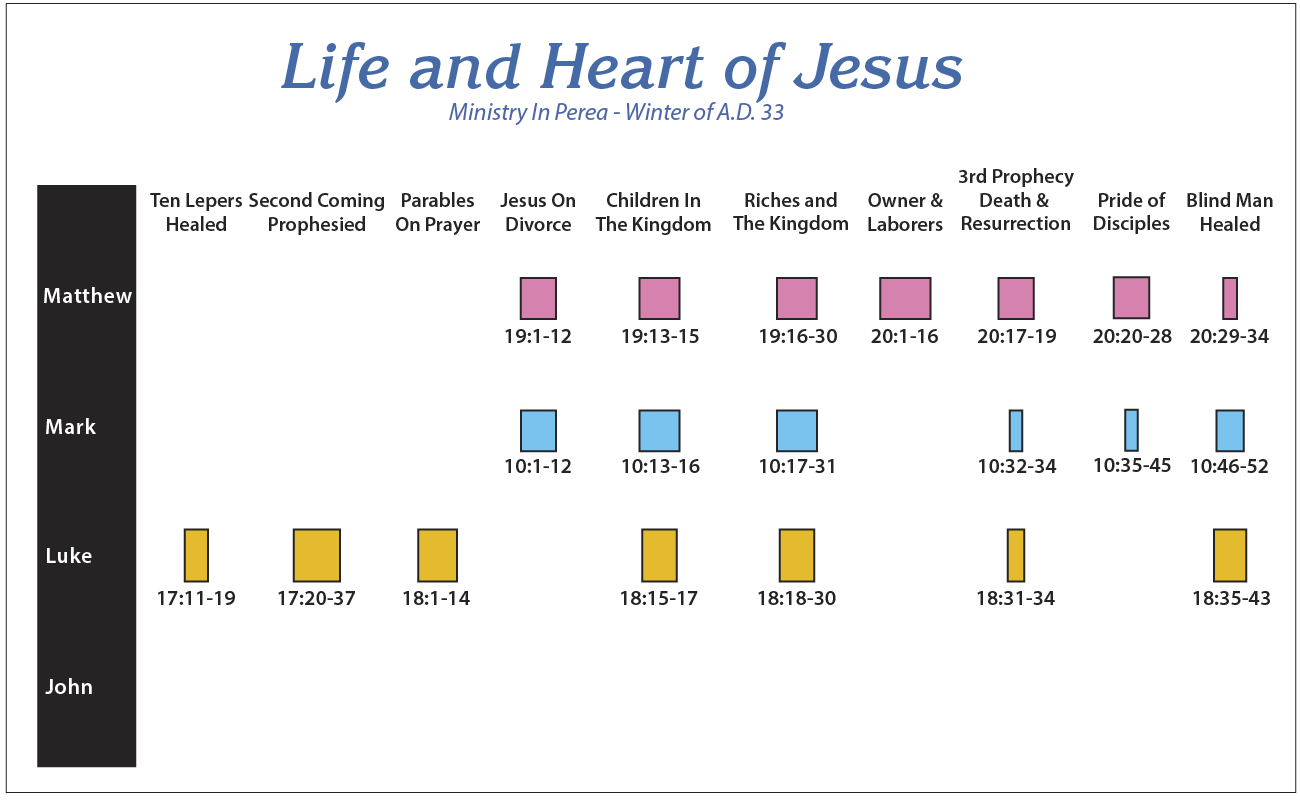
Jesus and the disciples have been together now for about three and half or perhaps four years. About two months ago (January 33 A.D.), Jesus and His disciples left Jerusalem after He raised Lazarus from the dead (John 11:41-46). They left because the religious leaders had finally decided to kill Him (John 11:47-57). So, Jesus and the disciples went North into Galilee, and He has been teaching and healing. It was now March, and it is estimated they are just days away from the city of Jerusalem when we come to our study. Jesus has just finished talking with the rich young ruler and has taught the twelve disciples that it is not possible for people to save themselves, but all things are possible with God. He taught them that God the Father was in complete control of all that happens in salvation. He calls, gives a person faith, and promises the elect eternal life. In this study, Jesus will tell the disciples that they are now going to return to Jerusalem. This means Christ will be crucified in about one week. Most of what remains in the gospels is about the final week of Jesus’ life before His death and resurrection. Jesus will not return to Galilee again until after He dies. In this study, you will hear Jesus’ announcement about the events that will occur very soon, and the disciples response (Matthew 20:17-19; Mark 10:32-34, and Luke 18:31-34).

Previous Prophecies of Jesus’ Death
Matthew 12:39-40 tells us that Jesus had made a very brief comment about His resurrection in the early part of A.D. 32. He said,
But He answered and said to them, “An evil and adulterous generation craves for a sign; and yet no sign will be given to it but the sign of Jonah the prophet; for just as JONAH WAS THREE DAYS AND THREE NIGHTS IN THE BELLY OF THE SEA MONSTER, so will the Son of Man be three days and three nights in the heart of the earth.” Matthew 12:39-40 (NASB)
Later Jesus was more specific when He prophesied to the disciples on two other occasions that the religious leaders would kill Him in Jerusalem and then He would be resurrected. The first time was in the summer of 32 A.D. On that occasion, Peter objected and Christ rebuked Satan (Matthew 16:21-23; Mark 8:31-33; Luke 9:21-22).
The second time Jesus told them again was in the early fall of 32 A.D. Matthew 17:22-23 records,
And while they were gathering together in Galilee, Jesus said to them, “The Son of Man is going to be delivered into the hands of men; and they will kill Him, and He will be raised on the third day.” And they were deeply grieved. Matthew 17:22-23 (NASB)
This time we are told they were deeply grieved at Jesus’ prophecy. But one wonders why were they grieved since Mark 9:32 reports that they did not understand because they were afraid to ask.
But they did not understand this statement, and they were afraid to ask Him. Mark 9:32 (NASB)
That is truly an amazing statement. It reveals they now had a very high opinion of Him. Jesus was so highly revered they were afraid to ask questions. Have you ever had trouble asking someone questions because you highly respected them? I have. That reveals an important truth about the apostles. It also reveals that Jesus was amazing!
Luke 9:45 says the disciples did not understand the meaning of Jesus’ comment because it had been hidden from them, and because they were afraid to ask for clarification.
But they did not understand this statement, and it was concealed from them so that they would not perceive it; and they were afraid to ask Him about this statement. Luke 9:45 (NASB)
The Greek word for “concealed” is parakalupto. It is a passive verb which means that the disciples did not do this; God did it to them. They received the action. Now why did God cause them to not understand? It is possible they would have done something that God the Father did not want them to do.

Returning to Jerusalem
Now it is about three to four months later, and the gospels of Matthew, Mark, and Luke tell us that Jesus gave a third prophecy of His death and resurrection to the twelve disciples as they are moving toward Jerusalem. Mark provides more information about what happened before Jesus gave the prophecy. Mark 10:32 states,
Now they were on the road going up to Jerusalem, and Jesus was walking on ahead of them; and they were amazed, and those who followed were fearful. And again He took the twelve aside and began to tell them what was going to happen to Him . . . Mark 10:32 (NASB)
Mark says that Jesus and the disciples were on the road that went up to Jerusalem. They were returning to Jerusalem after about two months of ministry away. John 11:54 told us that they had left for the city of Ephraim after Jesus had raised Lazarus from the dead. He and the disciples had left Jerusalem because the religious leaders had planned to murder Him (John 11:47-53). John 11:16 has already revealed the disciples knew that it was dangerous for Jesus to be in Jerusalem. They had left to prevent Jesus from being murdered. It was not yet time for Jesus to die. But now it was time. They are now only about one week away from the feast of Passover on April 1, 33 A.D.
So, we are told they were going up to Jerusalem. Jesus was walking ahead of them, leading the way. There were two groups of people with Jesus: the twelve disciples and another group. The Greek grammar clearly reveals there were two different groups. The first group were the disciples. They were amazed that they were going to Jerusalem. The disciples knew it was very dangerous for Jesus to return to the city. On a scale of 1 to 5, the danger for Christ was a 5+. The second group may have been other disciples. Whoever they were, they were afraid, apparently, because they knew the religious leaders wanted to murder Jesus.
When we are told that Jesus took them aside “again,” we should understand this to refer to the fact that Jesus routinely had private meetings with the disciples about His plans. Jesus was disciplining or mentoring them. So, the again[1] simply means that Jesus had another private meeting with the twelve disciples alone. He did not include the other group of disciples that was also following Him.
Both Luke 18:31 and Matthew 20:17 communicate the same fact that Jesus and the disciples are moving toward Jerusalem. However, the NASB seems to imply that Matthew 20:17 tells us they were about to go up. The actual Greek simply means they were already going up and Jesus was talking about their destiny.
We will discover later in Matthew 20:29 that Jesus and the disciples will soon be arriving in Jericho. That means they were somewhere in the Jordan Valley and would soon be in Jericho. Since Jericho had an elevation of about -250m (-830 feet), and the elevation of Jerusalem is about 780 m (2,560 feet), this explains why we are told they are were about to go up to Jerusalem. Since Jericho is about 46 km (24.2 mi) miles from Jerusalem, this means it will take them at least one to two days before they will reach Jerusalem.

Third Prophecy of Jesus’ Death
Luke 18:31 gives us information that is not shared by Matthew and Mark. The verse says,
Then He took the twelve aside and said to them, “Behold, we are going up to Jerusalem, and all things which are written through the prophets about the Son of Man will be accomplished.” Luke 18:31 (NASB)
Jesus told the disciples that everything the prophets had said would happen to the Son of Man would be fulfilled in Jerusalem. So, what did the prophets prophesy about Jesus? Luke 18:32-33 tells us. It says,
For He will be handed over to the Gentiles, and will be mocked and mistreated and spit upon, and after they have scourged Him, they will kill Him; and the third day He will rise again. Luke 18:32-33 (NASB)
Jesus shared seven important facts that were prophesied about Him with the disciples. Mark 10:33-34 adds some details that Luke did not include. He reported,
Behold, we are going up to Jerusalem, and the Son of Man will be delivered to the chief priests and the scribes; and they will condemn Him to death and will hand Him over to the Gentiles. They will mock Him and spit on Him, and scourge Him and kill Him, and three days later He will rise again. Mark 10:33-34 (NASB)
Mark added that Jesus would “be delivered to the chief priests and the scribes; they will condemn Him to death.” Matthew added the fact that Jesus would be crucified. Neither Mark nor Luke included that fact. Matthew reported,
Behold, we are going up to Jerusalem; and the Son of Man will be delivered to the chief priests and scribes, and they will condemn Him to death, and will hand Him over to the Gentiles to mock and scourge and crucify Him, and on the third day He will be raised up. Matthew 20:18-19 (NASB)
This gives us the biblical principle we need to examine every biblical passage about a topic in order to have a full understanding. Each gospel provides some information the other gospels did not include. But together they give us a complete understanding of what happened. All together we have nine prophecies or facts that Jesus shared with the disciples.
1st — Delivered to the Religious Leaders
The first prophecy that Jesus shared is that the He would be delivered to religious leaders, who were the chief priests and scribes (Mark 10:33). Since we are not told to which prophecy He was referring, we can only speculate. One prophecy may be Isaiah 53:3. The verse refers to the rejection of the Messiah, and then it says, “we did not esteem Him.” The “we” would include the religious leaders. Zechariah 11:8 has been understood by the ancient Jews to refer to the priests, elders, and scribes. If true, the phrase “weary of me” would refer to Christ. That is, the religious leaders were weary of Him and took action to remove Him. Therefore, they condemned Him to death. John 11:47-53 describes the religious leaders’ frustration with Jesus. They were “weary” of Jesus. So, they condemned Him to death (Luke 22:66-23:7). Two more prophecies that clearly apply are Psalm 22:12-13, 16.
2nd—Handed Over to the Gentiles
The second prophecy Jesus mentioned is that “He will be handed over to the Gentiles” (Luke 18:32). Psalm 22:16 is a prophecy about the death of Christ. The prophecy says,
For dogs have surrounded me;
A band of evildoers has encompassed me;
They pierced my hands and my feet.
Psalm 22:16 (NASB)
The context is obvious, and the first line may allude to Gentiles because the Jews of that day called Gentiles dogs.
3rd—Will be Mocked
Next, Jesus said the prophets prophesied that He would be mocked. Psalm 22:6-7 is maybe the most important prophecy that said Jesus would be mocked. Verse 6 of the chapter tells us the Messiah would be a reproach of men, that is, He would be scorned or taunted. The Messiah would also be despised.
But I am a worm and not a man,
A reproach of men and despised by the people.
All who see me sneer at me;
They separate with the lip, they wag the head . . . Psalm 22:6-7 (NASB)
Verse 7 says others would “sneer at” Him, “separate the lip” and wag their heads at Him. The Hebrew word for “sneer” also means “to mock.” This prophecy clearly was fulfilled when Christ died (Matthew 27:31; Mark 15:31; Luke 22:63; 23:11, 36).
4th—Be Mistreated
The fourth prophecy says that the Messiah would be mistreated. The Greek word for “mistreated” is hubrizo. The word has the primary meaning of “insult,” or “to act shamefully toward someone.” Isaiah 53:3 prophecies that the Messiah would be despised and forsaken. It describes the attitude of the leaders and everyone else who would be present at His trial, the call for Him to be crucified, and the crowd watching Him die.
He was despised and forsaken of men,
A man of sorrows and acquainted with grief;
And like one from whom men hide their face
He was despised, and we did not esteem Him.
Isaiah 53:3 (NASB)
Psalm 22:6 makes a more specific prophecy. It prophesies that the Messiah will be a reproach.
But I am a worm and not a man,
A reproach of men and despised by the people.
Psalm 22:6 (NASB)
The Hebrew word for “reproach” refers to “being taunted,” or “being shamed.” Now that is mistreatment! In Matthew 27:27-30 we are told the soldiers shamed Jesus by stripping Him naked, and gambling for His clothes. Mark 15:16-17 says the Roman soldiers dressed Jesus as a king and put a crown of thorns on His head. They beat Him with reeds. They mistreated Christ. Matthew 27:27-31, 35, 38, 40, 42-43, 48-49 lists other forms of mistreatment.
Zechariah 11:12-13 prophesied that the Messiah would be betrayed, and He was by Judas. That is another form of mistreatment.
5th—Be Spit Upon
The fifth prophecy that Jesus referred to was that people would spit on Him. Isaiah 50:6 is a clear prophecy that states this would happen to the Messiah. The verse says,
I gave My back to those who strike Me,
And My cheeks to those who pluck out the beard;
I did not cover My face from humiliation and spitting.
Isaiah 50:6 (NASB)
This prophecy adds that His back would be struck. His beard would be pulled, and yet, He would try to hide his humiliation.
6th—Be Scourged
The sixth prophecy that Jesus mentioned to the disciples was that He would be scourged. We have already discovered Isaiah 50:6 prophesied that His back would be hit. Isaiah 52:14 states that His appearance would be deformed.
Just as many were astonished at you, My people,
So His appearance was marred more than any man
And His form more than the sons of men.
Isaiah 52:14 (NASB)
Isaiah 53:5 also refers to His scourging,
. . . And by His scourging we are healed. Isaiah 53:5b (NASB)
7th—Be Killed
The seventh prophecy Jesus shared with the disciples is that He would be killed. There are several clear and obvious prophecies that refer to His death. Here are three of them.
By oppression and judgment He was taken away;
And as for His generation, who considered
That He was cut off out of the land of the living
For the transgression of my people, to whom the stroke was due?
Isaiah 53:8 (NASB)Then after the sixty-two weeks the Messiah will be cut off and have nothing . . . Daniel 9:26 (NASB)
I will pour out on the house of David and on the inhabitants of Jerusalem, the Spirit of grace and of supplication, so that they will look on Me whom they have pierced; and they will mourn for Him, as one mourns for an only son, and they will weep bitterly over Him like the bitter weeping over a firstborn. Zechariah 12:10 (NASB)
Isaiah 53:8 prophesied the Messiah would be “cut off out of the land of the living.” Daniel 9:26 simply states, “the Messiah will be cut off,” and Zechariah 12:10 prophesied the Messiah will have been pierced. That is, they killed Him and pierced Him with nails and a sword.
8th—Rise on the Third Day
The eighth prophecy that Jesus gave was that He would be resurrected. Acts 2:24-32 provides the prophecy and explains the prophecy. The prophecy is found in Psalm 16:8-11. Psalm 110:1 also requires that the Messiah would again be alive. Here is Psalm 16:10.
For You will not abandon my soul to Sheol;
Nor will You allow Your Holy One to undergo decay.
Psalm 16:10 (NASB)
There are other prophecies about Christ’s death to which Matthew, Mark, and Luke do not refer. There are prophecies that Jesus would be betrayed by a friend, who was Judas (Psalm 41:9; Zechariah 11:12-13). Another prophecy said the disciples would forsake Him (Zechariah 13:7). The soldiers would gamble for His clothes (Palm 22:18). His hands and feet would be pierced (Psalm 22:16; Zechariah 12:10). The Messiah would die between two criminals (Isaiah 53:12). Finally, the Messiah would return to heaven (Psalm 16:10; 68:17-18; 110:1).
Jesus’ Death
Amazingly, we are told that the disciples did not understand Jesus’ message.
But the disciples understood none of these things, and the meaning of this statement was hidden from them, and they did not comprehend the things that were said. Luke 18:34 (NASB)
This was not the first time the disciples did not understand something that Jesus said. Luke 9:45 tells they did not understand the first time Jesus told them. They did not understand the second time either (Mark 9:32). This is the third time they did not understand Jesus’ message. But this time we are told that Jesus’ statement was “hidden” from them. The Greek grammar reveals that the word “hidden” is in the passive tense. Someone was hiding it from them. That is, God was hiding the meaning from them. The Greek grammar also reveals that God the Father had been doing this. We have already discovered that it happened both the first time and the second time Jesus shared the news.
Why would God the Father hide the information? We are not told. Maybe they would have taken action that would not be helpful to Jesus. Maybe they would have been too discouraged since they thought that Jesus was going to establish the kingdom. They were wrong. If they had known, they may have stopped following Jesus. Whatever the reason, God the Father hid the meaning from the disciples.
Conclusion
This simple statement from Jesus would be remembered later (Luke 24:45; John 12:16). That is why Jesus told them. They would remember later and understand.
Maybe they were not permitted to understand so that they would not stop Jesus from dying. God the Father’s plan had been revealed in the prophecies. We have learned that Jesus shared the Old Testament about His betrayal, horrible mistreatment, crucifixion, and glorious resurrection. The Father’s plan was for the Lamb of God to die. He came to die and nothing was going to stop the plan for Jesus to die for the sins of the world. The plan to rescue the elect from their sins would not be thwarted. The disciples could not be permitted to stop the plan.
But they would later understand. When they did, we can only imagine the surprise and joy they must have felt when they realized the plan was fulfilled in their lifetime. They witnessed what the prophets and angels wished to understand but could not (1 Peter 1:10-12). Do you understand that Jesus died for your sins and was resurrected? His resurrection is proof that He was and is God. It also proves He was and is the perfect Lamb of God Who takes away our sins. Do you want your sins forgiven? Then tell Him!
Reference:
1. William Hendricksen states, “Note “again,” for this was not the only time that Jesus made a temporary separation between groups of followers, or even within a group. See Mark 3:13 (cf. Luke 6:13); 4:35, 36; 5:37, 40; 6:31, 45; 7:17, 33; 9:2; 14:32, 33; and see also 9:30.” William Hendricksen. Mark. New Testament Commentary. Baker Books. 1975. p. 404.
Suggested Links:
Life of Christ – events, miracles, teachings and purposePeter’s Confession – You are the Christ, the Son of God
The Two Drachma Tax
Benefits of the Resurrection
The Victorious Lamb That Suffered
Because He Lives
Proof of the Resurrection of Christ
Resurrection Accounts - Resurrection of Christ